Ever walked into a casino and felt like you’ve entered a different world? Well, that’s exactly what casino designers want you to experience. These places aren’t just random entertainment spots, they’re actually clever behavioral science experiments in disguise. Trust me, everything you see 슬롯사이트 먹튀검증 around you, from the winding paths between gaming tables to those catchy little tunes coming from the slot machines, serves a purpose.
You might think you’re calling all the shots when it comes to your gambling decisions, but here’s the thing – casinos are masters at subtle persuasion. They’ve done their homework on human psychology, and they’re using that knowledge to keep you playing just a bit longer, betting just a little more.
Think about it like this: imagine you’re grocery shopping when you’re hungry. You end up buying way more snacks than you planned, right? Casinos work in a similar way. They create an environment that nudges you toward making choices you probably wouldn’t make in other situations. Those bright lights, the sound of winning machines, even the free drinks, they’re all part of a carefully crafted strategy.
Let’s be real, even the most level-headed people can get caught up in the casino atmosphere. It’s not because they’re being foolish – it’s because these venues are incredibly good at what they do. They understand human behavior so well that they can predict and influence our decisions without us even realizing it.
So next time you hit the casino floor, remember that you’re stepping into more than just a place to try your luck. You’re walking into a space where every detail, from the carpet patterns to the ceiling height, has been designed with one goal in mind: keeping you there and keeping you playing.
The Architecture of Temptation
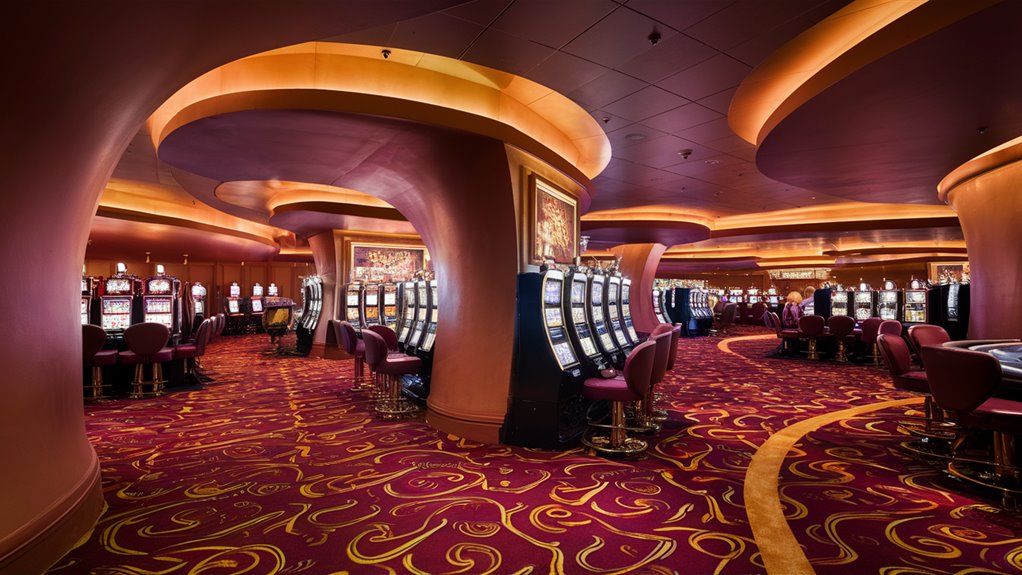
Ever wonder why it’s so easy to lose track of time in a casino? Well, there’s actually some clever psychology behind every detail you see – or don’t see. Let’s dive into how these gambling palaces are carefully crafted to keep you playing just a bit longer.
You know how you never seem to spot any clocks or windows once you’re inside? That’s totally on purpose. Without those usual time markers, you’re wrapped in this bubble where hours just slip away.
And finding your way out? Good luck with that! The layout is like a fancy maze, tempting you with gaming opportunities at every turn.
Picture this: you walk through those grand entrance doors and boom – you’re hit with a symphony of lights and sounds from strategically placed slot machines. Pretty hard to resist, right?
They’ve got it all mapped out, with 커뮤니티 먹튀검증 장단점 the crowd favorites sitting at busy crossroads, while those high-roller tables and premium slots are tucked away like hidden treasures, making you weave through other games to find them.
The whole atmosphere is carefully controlled too. They keep the ceilings low and the lighting focused, creating this cozy vibe that makes everything feel more personal.
And that red decor you see everywhere? It’s not just for show – it actually gets your heart pumping and energy flowing.
Even that busy carpet pattern under your feet has a job: keeping your eyes up where all the action is.
They’ve thought of everything, from pumping extra oxygen into the air to keep you alert, to maintaining that perfect room temperature so you’ll stay comfortable for hours on end.
Sound and Light Psychology
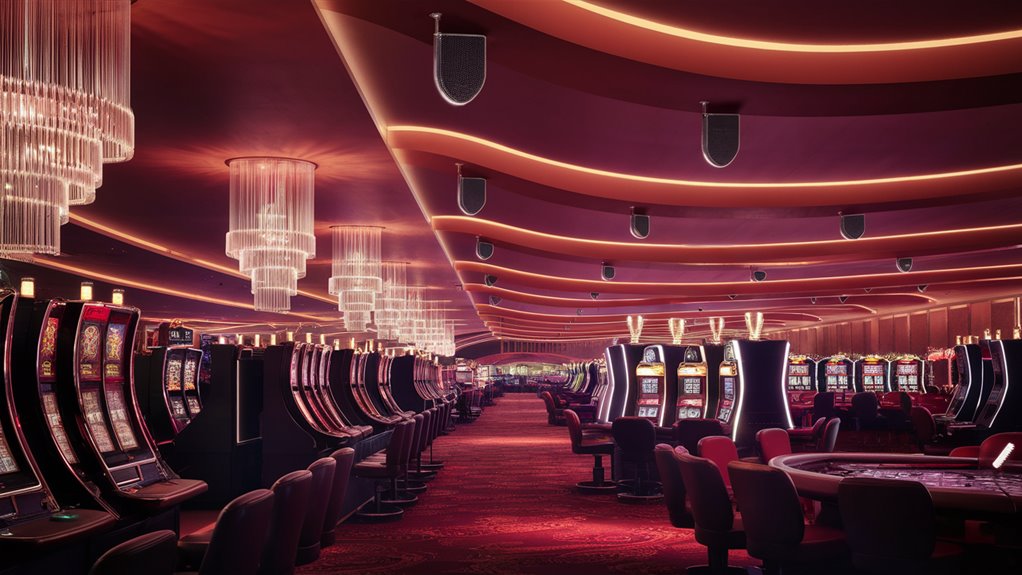
Let’s talk about how casinos use light and sound to shape our behavior. You know how time seems to disappear when you’re in a casino? Well, that’s no accident.
They’ve got this clever lighting setup that creates what feels like a permanent sunset inside, keeping you comfortable but just a bit disoriented about whether it’s day or night. The lighting is super smooth too, no harsh spots or annoying glare to make your eyes tired.
Now, about those slot machines – they’re basically tiny concert halls. Have you ever noticed how they all seem to play in perfect harmony? That’s because they’re tuned to the key of C, which sounds pretty pleasant to our ears.
Even when you lose, the machines play these upbeat little tunes that make your brain think you almost won. Pretty sneaky, right?
The whole casino is like one big symphony of sound, really. Between the cheerful dings of the slots, the shuffle of cards, and the background music, they create this bubble of excitement that just pulls you in.
Research shows this combination of sounds actually makes people more willing to take risks and stick around longer. It’s fascinating how our brains respond to these carefully planned sound and light combinations, isn’t it?
What makes it really effective is how they balance everything. The noise level hits this sweet spot where it’s exciting enough to keep you alert but not so loud that it gives you a headache.
And those winning sounds? They make sure you hear those crystal clear, while the sounds of losing kind of fade into the background. It’s like they’ve figured out the perfect recipe for keeping players engaged and coming back for more.
Time Distortion Techniques

You know how casinos seem to exist in their own little universe? There’s a fascinating reason for that. These places are masters at making you lose track of time, and they do it in some pretty clever ways.
Take a look around next time you’re in a casino – you won’t spot a single clock on those walls. And those windows? They’re either blocked off or tinted so dark you can’t tell if it’s midnight or noon outside. It’s no accident – they want you in this timeless bubble where hours just slip away.
The way they’ve laid out everything is super sneaky too. Getting to the exit? Good luck finding a straight path there.
Even something as simple as going to the bathroom means you’ll have to weave through rows of slot machines and gaming tables. They’ve even thought about the air you’re breathing, pumping in extra oxygen to keep you bright-eyed and ready to play.
Want to grab a bite or get a drink? Well, they’ve got that figured out perfectly. You’ll find quick food spots right next to where you’re playing, and friendly servers keep showing up with free drinks.
And there’s this constant buzz of activity all around you – flashing lights, the happy sounds of winning machines, people cheering at tables. Before you know it, you’re caught up in this endless moment where time just stands still.
Strategic Layout and Navigation
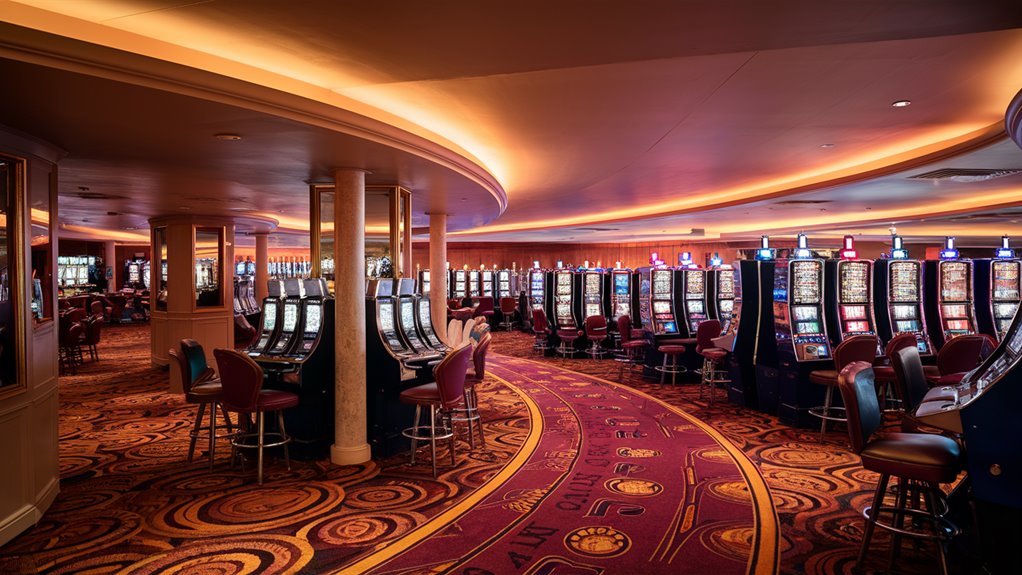
Let’s talk about how casinos design their floors – it’s actually pretty fascinating when you think about it. You know how sometimes you walk into a casino planning to head straight to the poker tables, but somehow end up taking all these twists and turns? Well, that’s no accident.
Casino layouts are like elaborate mazes, carefully crafted to keep you engaged and, let’s be honest, spending more money. Picture this: you’re walking through, and instead of finding a straight shot to your destination, you’re gently guided through winding paths filled with flashing lights and enticing games.
It’s what industry folks call the “Friedman principle,” and it ensures you’ll bump into plenty of gambling opportunities along your journey.
Have you ever noticed there aren’t any clocks or windows in most casinos? And finding the exit can feel like solving a puzzle. That’s intentional too.
Instead, what you’ll find are slot machines arranged in cozy circles or short rows, creating these intimate little spaces that make you feel right at home. They’re pretty clever about where they put their most profitable machines too, usually right where you can’t miss them, near the elevators, restaurants, and show venues.
Want to find the most popular games? You’ll need to venture deeper into the casino floor, passing by countless other tempting options along the way.
And those narrow walkways between gaming areas? They’re designed to create this buzzing atmosphere of excitement and energy. The whole setup makes it tricky to find your way out quickly, which, of course, makes it more likely you’ll stick around and keep playing.
Reward Systems and Dopamine
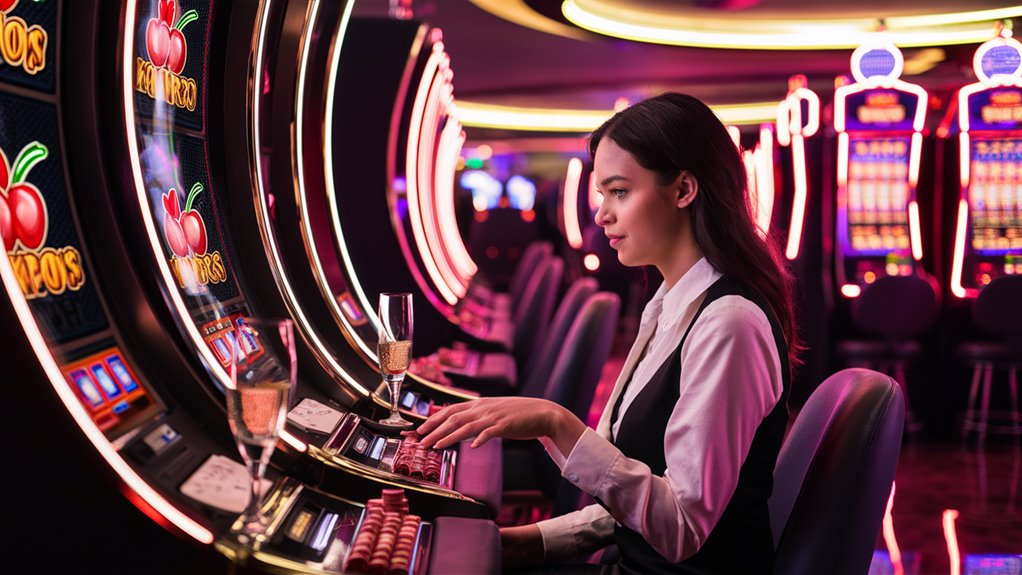
Ever wonder what happens in your brain when you hit that winning streak? Well, it’s pretty fascinating.
Your brain releases a feel-good chemical called dopamine every time you win, creating this natural rush that makes you want to keep going. It’s like getting a tiny reward that lights up your brain’s pleasure centers.
You know how casinos have all those bright lights and exciting sounds? That’s not just for show.
They’ve actually designed everything to enhance these good feelings. When those slot machines light up and ring bells, your brain gets an extra kick of excitement. And here’s something interesting – even when you almost win, your brain reacts almost the same way as if you’d actually won.
That’s why seeing those winning symbols just miss the payline can be so compelling.
But there’s more to it than just the games themselves. Think about those loyalty programs casinos offer.
Each time you level up or get a free perk, your brain gives you another little dose of dopamine. And they’re pretty clever about how they time these rewards.
Instead of giving them to you on a regular schedule, they mix it up. Sometimes you win, sometimes you don’t – just like when you’re playing with a cat and randomly move the toy around.
This random pattern actually makes the whole experience more engaging than if you won every single time.
Social Proof and Competition
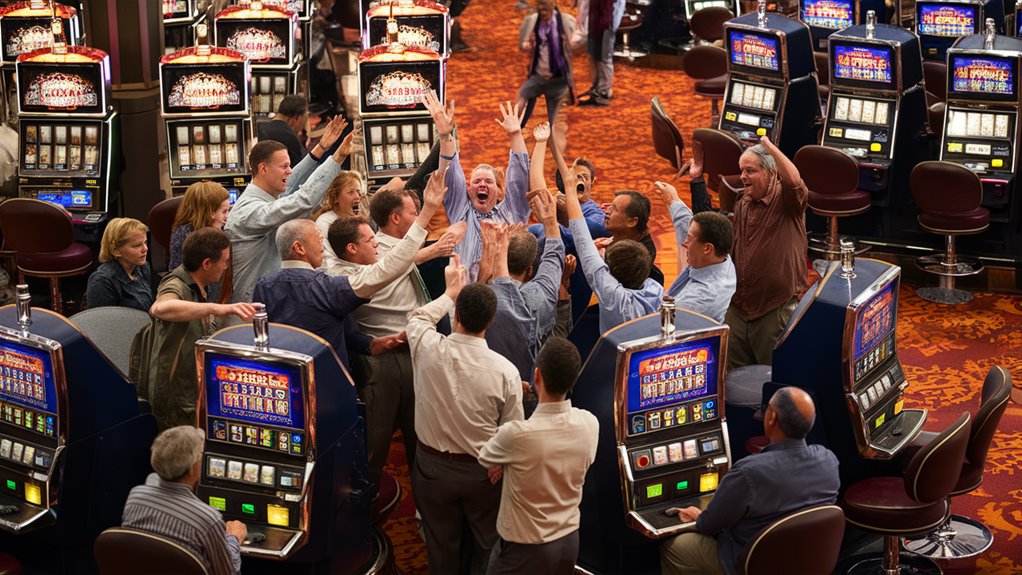
You know how we’re all wired to follow the crowd and compete with others? Well, casinos have totally figured this out.
Take slot machines, for instance. Ever noticed those flashy displays showing “recent winners” and “hot machines”? They’re not just random information – they’re carefully designed to make you think, “Hey, everyone’s winning except me!” It’s that classic fear of missing out kicking in.
The whole casino floor is like a stage where winning moments become mini-celebrations. Those loud victory sounds and flashing lights aren’t just for the lucky winners.
They’re actually meant to catch your attention and plant a little seed in your mind that says, “That could be you next time!” When you hear the exciting jingle of coins or the triumphant ring of a jackpot, it’s pretty hard not to feel like your big moment is just around the corner.
Let’s talk about those player’s club cards for a minute. Have you seen how they set up those membership levels? It’s pretty clever, really.
From silver to gold to platinum, they make sure everyone knows exactly where they stand. It’s like a little social ladder that gets you thinking, “Well, if they made it to platinum, why can’t I?”
Add in those digital leaderboards and tournament announcements, and suddenly you’re not just playing for fun anymore – you’re trying to keep up with the high rollers. Before you know it, you might find yourself betting a bit more or playing longer than you planned, all because you want to climb that status ladder.
Common Questions
Do Casinos Employ Psychologists to Develop Their Profit-Maximizing Strategies?
You know, it’s fascinating how casinos tap into the power of psychology to boost their profits. Many people don’t realize that behind those flashing lights and exciting sounds, there’s often a team of behavioral psychologists working behind the scenes. These experts carefully study how players think, feel, and act while gambling.
Let’s break it down a bit. Casinos regularly bring in psychology professionals who specialize in human behavior and decision-making. Their job? To figure out what makes players tick and how to keep them engaged longer. Think about it like a retail store layout, but way more sophisticated. These experts analyze everything from the gaming floor layout to the sound effects that play when you win.
They look at simple things, like why players might prefer certain machines, and complex stuff, like how different reward patterns affect gambling behavior. The data they collect helps casinos create more appealing environments that encourage longer playing sessions and, naturally, bigger spending.
But here’s the interesting part: these strategies aren’t just random guesses. They’re based on solid behavioral science and countless hours of observing real players in action. From the carpet patterns that keep your eyes focused on the games to the carefully timed cocktail service, pretty much everything in a casino has been psychologically fine-tuned for maximum impact.
How Much Do Casinos Spend Annually on Behavioral Research Studies?
You know how casinos seem to know exactly what makes players tick? Well, there’s actually some serious research behind those perfectly placed slot machines and enticing loyalty programs. While casinos tend to keep their cards close to their chest when it comes to exact research spending, industry insiders tell us the numbers are pretty staggering.
Let’s break it down. Major casino groups pour millions into understanding player psychology each year. Think about it like this: just as retail giants study shopping habits, casinos invest heavily in figuring out what keeps players coming back for more. They analyze everything from floor layouts to reward systems, and even the effects of specific sounds and lights on gaming behavior.
The really interesting part? This isn’t just casual observation. We’re talking about sophisticated behavioral studies, focus groups, and advanced data analytics. Casino operators work with top research firms and universities to crack the code of player preferences and habits. While they’re naturally tight-lipped about specific budget figures, experts in the field suggest that larger casino groups individually spend anywhere from several million to tens of millions annually on this kind of research.
Some smaller casinos might invest less in formal studies, but they’re definitely paying attention to player behavior too. After all, understanding what makes customers tick isn’t just good science, it’s smart business.
Are Casino Behavioral Manipulation Techniques Regulated by Gaming Commissions?
Let’s talk about casino regulations and those clever psychological tricks casinos use. You might be surprised to learn that while gaming commissions keep a close eye on things like payouts and game fairness, they’re not really watching the psychological side of things.
Think about it this way: imagine you’re playing at a slot machine. The commission makes sure you’re getting fair odds on winning, but they’re not particularly concerned about why the casino placed that machine near the buffet, or why the lights and sounds are so captivating. Pretty interesting, right?
While some places do have basic rules against clearly deceptive practices, most of those subtle techniques casinos use to keep you playing, like maze-like layouts or the absence of clocks, fall into a regulatory gray area. It’s kind of like how grocery stores can put candy at the checkout without any special oversight.
The truth is, most behavioral manipulation techniques in casinos operate pretty freely. Sure, a casino can’t outright lie to you about your chances of winning, but they can certainly use psychology to make their environment more appealing and encourage longer playing sessions. It’s just part of the business, much like how retailers use specific scents or music to influence shopping behavior.
Can Individuals With Gambling Addiction Sue Casinos for Exploitative Practices?
Let’s talk about the reality of suing casinos when dealing with gambling addiction. While it might seem like casinos should bear some responsibility, the legal path isn’t as straightforward as you might think.
Here’s the thing – casinos generally have pretty solid legal protection as long as they’re following state regulations and gaming laws. Think of it like a restaurant that serves alcohol: they’re allowed to operate their business, but they need to follow specific rules.
That said, you do have some options. The most practical step is joining a self-exclusion program, where you voluntarily ban yourself from the casino. If the casino then fails to stop you from gambling after you’ve self-excluded, you might have grounds for legal action.
For example, if you signed up for self-exclusion but the casino still sent you promotional materials or let you gamble anyway, you could potentially seek damages. Some gamblers have successfully sued casinos in these situations, though it’s worth noting these cases are pretty rare.
Your best bet? Focus first on protecting yourself through self-exclusion and getting professional help for addiction. If the casino violates your self-exclusion agreement, that’s when you might want to talk with a lawyer about your legal options. Remember, there’s no shame in seeking help – many people have walked this path before.
What Percentage of Casino Profits Comes From Behavioral Science Implementations?
You know how casinos seem to have everything figured out when it comes to keeping players at the tables? Well, there’s actually some fascinating science behind it. While casinos tend to keep their cards close to their chest about exact numbers, industry experts have a pretty good idea about how much of their profits come from behavioral science tricks.
From what we can tell, somewhere between 30% to 60% of casino revenues are directly tied to psychological design elements and clever behavioral strategies. Think about it – everything from the maze-like layout that keeps you wandering past slot machines, to the carefully timed comp drinks, to those hypnotic sound effects that make near-misses feel like wins.
The exact percentage is tough to pin down because casinos aren’t exactly rushing to share their playbook. But just look around next time you’re in one – notice how there are no clocks or windows? How about those low ceilings that create an intimate feeling, or the carpet patterns that somehow keep you focused on the gaming floor? It’s all carefully orchestrated to influence behavior in ways that boost profits.
The truth is, these psychological tactics are so deeply woven into the casino experience that it’s hard to separate them from the basic business model. And while we can’t get precise numbers, industry insiders consistently point to these design elements as major drivers of casino profitability.